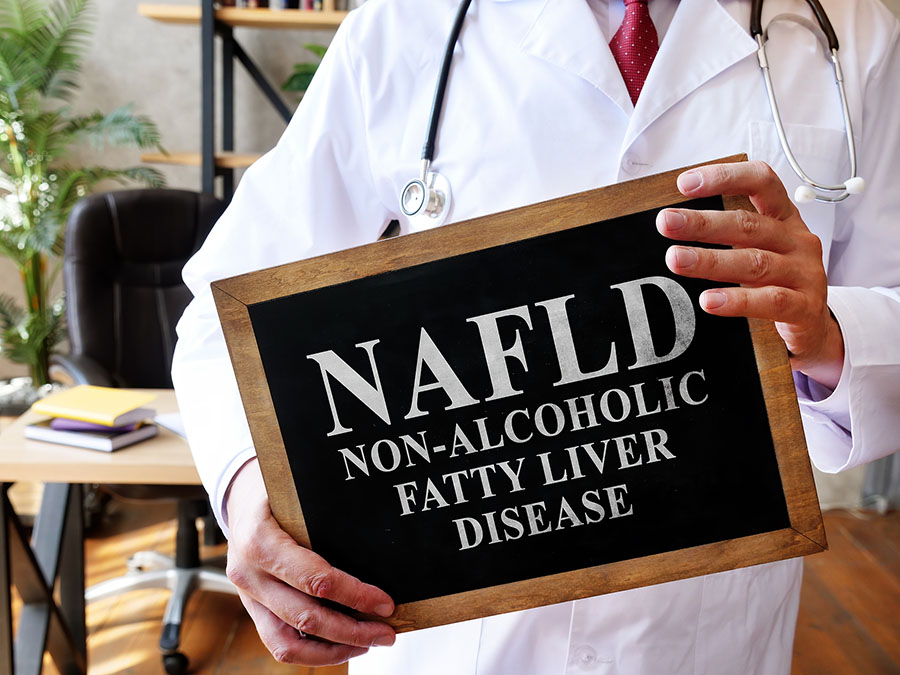 If left untreated, nonalcoholic fatty liver disease (NAFLD) can lead to severe liver conditions like fibrosis and even liver cancer.
If left untreated, nonalcoholic fatty liver disease (NAFLD) can lead to severe liver conditions like fibrosis and even liver cancer.
And there is no effective medical solution for NAFLD.
A recent study published in the journal Nutrition & Diabetes has found a plant that can drastically reverse, even heal, NAFLD.
Alantolactone is a substance extracted from plants in the Asteraceae family. It’s known for its anti-inflammatory properties, but its effects on liver disease were not well understood before this study.
To explore alantolactone’s potential, researchers conducted a study on mice and liver cells.
First, they fed a group of C57BL/6 mice a high-fat diet for 16 weeks. This diet caused the mice to develop NAFLD, mimicking the disease process in humans.
After 16 weeks, they started giving some of the mice alantolactone by mouth. They continued this treatment to observe its effects on liver disease.
In addition to the mouse experiments, the researchers used a mouse liver cell line called AML-12. They treated these cells with alantolactone before exposing them to palmitic acid, a fatty acid that can induce inflammation and oxidative stress, similar to what happens in NAFLD.
The findings from these studies were quite promising.
-
1. Mice treated with alantolactone showed much lower levels of liver inflammation.
2. Alantolactone also reduced the development of liver fibrosis, a dangerous thickening and scarring of liver tissue.
3. In both the mice and the liver cells, alantolactone reduced oxidative stress, which is a harmful process that can damage cells and tissues.
The researchers didn’t just stop at observing these beneficial effects; they also dug deeper to understand how alantolactone works, and found two mechanisms.
-
1. It helps activate a protein called Nrf2, which plays a crucial role in protecting cells from oxidative stress.
2. It inhibits NF-Kappa-B, a protein complex that controls inflammation. By blocking this pathway, alantolactone can reduce inflammation in the liver.
So, alantolactone has a protective effect on the liver by reducing inflammation and oxidative stress. This makes it a promising candidate for treating NAFLD.
The only problem at this stage is that alantolactone is only available for sale to researchers and laboratories.

 Overcoming IBD
Overcoming IBD Multiple Sclerosis
Multiple Sclerosis Banishing Bronchitis
Banishing Bronchitis Gum Disease Gone
Gum Disease Gone Overcoming Onychomycosis
Overcoming Onychomycosis Neuropathy No More
Neuropathy No More The Prostate Protocol
The Prostate Protocol Brain Booster
Brain Booster
 Ironbound
Ironbound
 Solution for Shingles
Solution for Shingles
 The Bone Density Solution
The Bone Density Solution
 The Ultimate Healing Protocol
The Ultimate Healing Protocol
 The Parkinson's Protocol
The Parkinson's Protocol
 The Chronic Kidney Disease Solution
The Chronic Kidney Disease Solution
 Overthrowing Anxiety
Overthrowing Anxiety The Fatty Liver Solution
The Fatty Liver Solution The Hypothyroidism Solution
The Hypothyroidism Solution
 The End of Gout
The End of Gout The Blood Pressure Program
The Blood Pressure Program
 The Oxigized Cholesterol Strategy
The Oxigized Cholesterol Strategy
 Stop Snoring And Sleep Apnea Program
Stop Snoring And Sleep Apnea Program
 The Arthritis Strategy
The Arthritis Strategy The Vertigo & Dizziness Program
The Vertigo & Dizziness Program The 3-Step Diabetes Strategy
The 3-Step Diabetes Strategy Hemorrhoids Healing Protocol
Hemorrhoids Healing Protocol The Erectile Dysfunction Master
The Erectile Dysfunction Master Weight Loss Breeze
Weight Loss Breeze The IBS Program
The IBS Program The Insomnia Program
The Insomnia Program The Migraine and Headache Program
The Migraine and Headache Program The Neck Pain Solution
The Neck Pain Solution The Menopause Solution
The Menopause Solution The Ejaculation Master
The Ejaculation Master The TMJ Solution
The TMJ Solution The Acid Reflux Solution
The Acid Reflux Solution The Fibromyalgia Solution
The Fibromyalgia Solution The Psoriasis Strategy
The Psoriasis Strategy